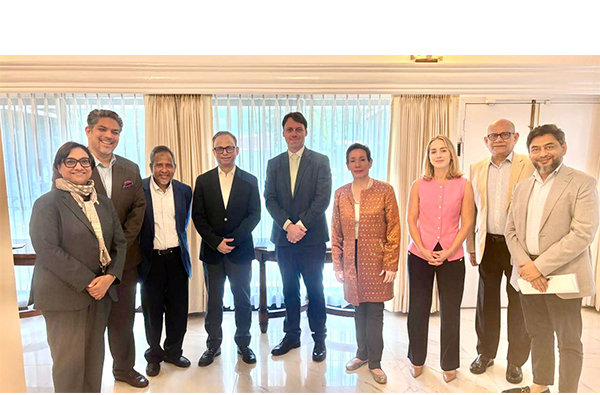


September 15, 2025
BGMEA-USTR Meeting Held: Discussions on Bilateral Trade and Reciprocal Tariffs
A delegation from the Bangladesh Garment Manufacturers and Exporters Association (BGMEA) met today with a U.S. trade delegation led by Assistant U.S. Trade Representative Brendan Lynch. The meeting, which took place at the Chief of Mission Residence in Gulshan, was organized by the U.S. Embassy in Dhaka and marked by fruitful discussions.
The BGMEA delegation was headed by President Mahmud Hasan Khan, and included Vice President Rezwan Selim, Directors Faisal Samad and Abdus Salam, and Chairman of the BGMEA Standing Committee on FTA and PTA, Lutfe M. Ayub.
The U.S. delegation included additional officials from the USTR, as well as Chargé d’affaires Tracey Ann Jacobsonand Labour Attaché Leena Khan from the U.S. Embassy in Dhaka.
The meeting focused primarily on reducing the reciprocal tariffs on Bangladeshi exports to the United States and enhancing bilateral trade cooperation.
BGMEA President Mahmud Hasan Khan noted, “We have already secured a 20% tariff, which is a positive step. However, the average MFN (Most Favored Nation) tariff on apparel exports from Bangladesh to the U.S. stands at 16.5%, and with the additional 20% reciprocal duty, the total tariff burden becomes approximately 36.5%. This creates significant challenges for our exports to the U.S. market.”
He urged the Assistant U.S. Trade Representative to consider further reducing tariffs to sustain the growth of Bangladesh’s apparel exports, particularly as this sector is the largest private-sector employer in the country.
Mahmud Hasan Khan also proposed using the “stacking method” to offset these duties against other product categories. He stated that such an approach would not only reduce the overall tariff burden but also enhance the competitiveness of Bangladeshi products in the U.S. market.
The discussion also covered a recent U.S. Executive Order, under which apparel exported from Bangladesh that contains 20% or more U.S.-origin raw materials could be eligible for proportional exemption from the 20% reciprocal tariffs.
Welcoming the initiative, the BGMEA leaders expressed interest in leveraging this opportunity. However, they inquired about the evaluation and traceability mechanisms that would be used to verify U.S. content in exports. In response, the U.S. side noted that U.S. Customs is currently working on finalizing these procedures and expects to complete the process within a set timeframe.
Labour law reform in Bangladesh was another key topic of discussion. The Assistant U.S. Trade Representative emphasized that aligning Bangladesh’s labour laws with international standards is highly anticipated. He recommended that Bangladesh amend its Labour Law 2006 in accordance with ILO guidelines.
The BGMEA President reassured the U.S. delegation of the industry's commitment to reform. He said that since assuming office, his board has initiated dialogue on labour issues, having already conducted discussions with 81 trade unions.
He added that BGMEA is continuously engaging with stakeholders on the proposed amendments to the Labour Law, considering the country’s realities, industry context, institutional capacity, and implementation feasibility. The association has already submitted specific proposals for amendments aimed at protecting both the industry and employment.
Mahmud Hasan Khan urged the U.S. delegation to view Bangladesh’s ongoing positive transformations in a constructive light.
The meeting concluded on an optimistic note, with the U.S. delegation expressing satisfaction with the discussions. They expressed hope for increased U.S. imports from Bangladesh, a reduction in the trade deficit, and further reductions in reciprocal duties in the future.

Copyright © 2020, The Bangladesh Garment Manufacturers and Exporters Association.
Version-2.0, Design & Developed by Systech Digital Limited.
Version-2.0, Design & Developed by Systech Digital Limited.
